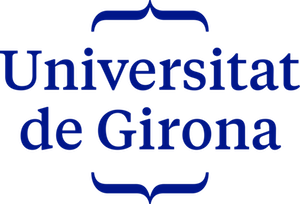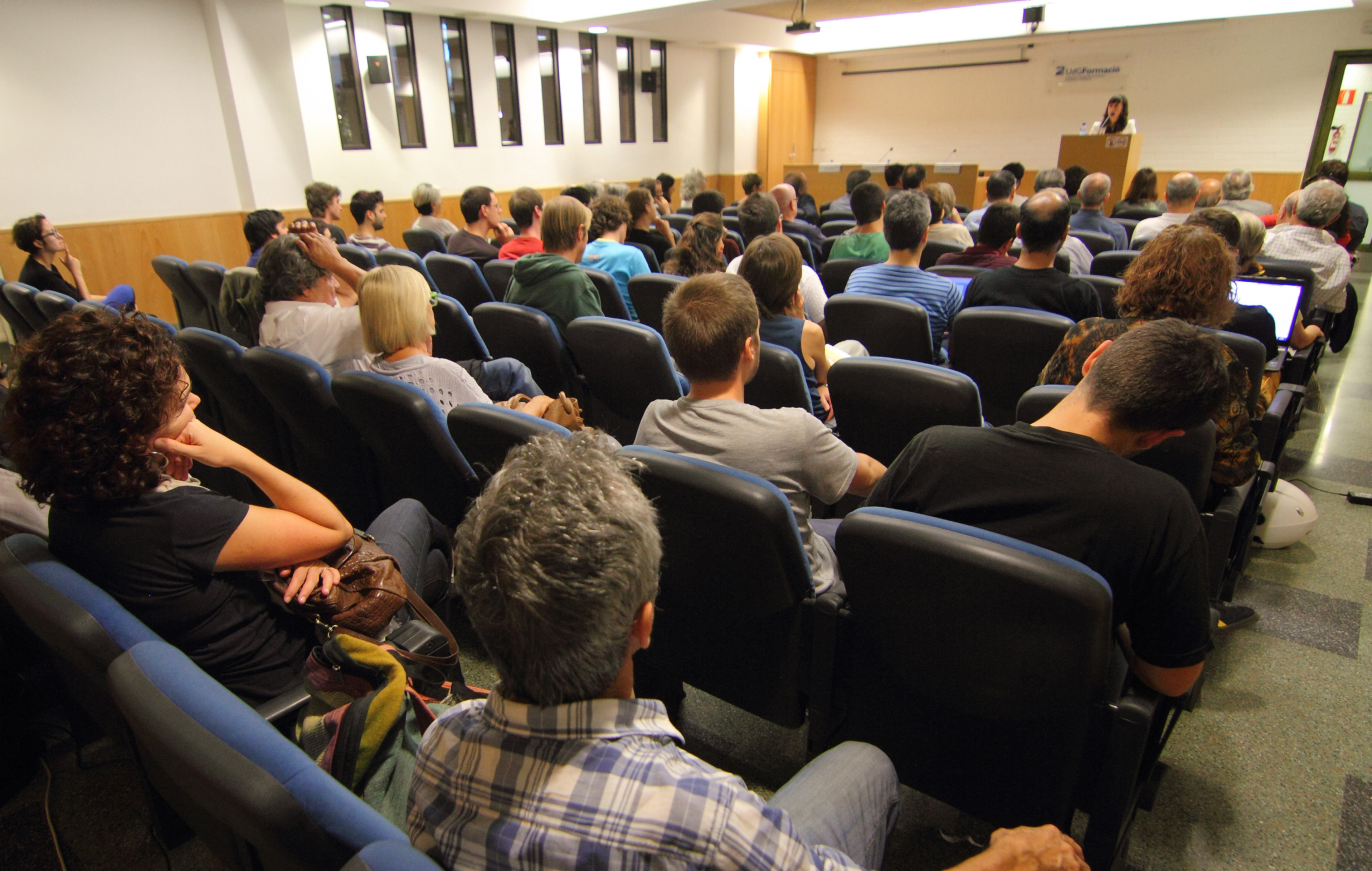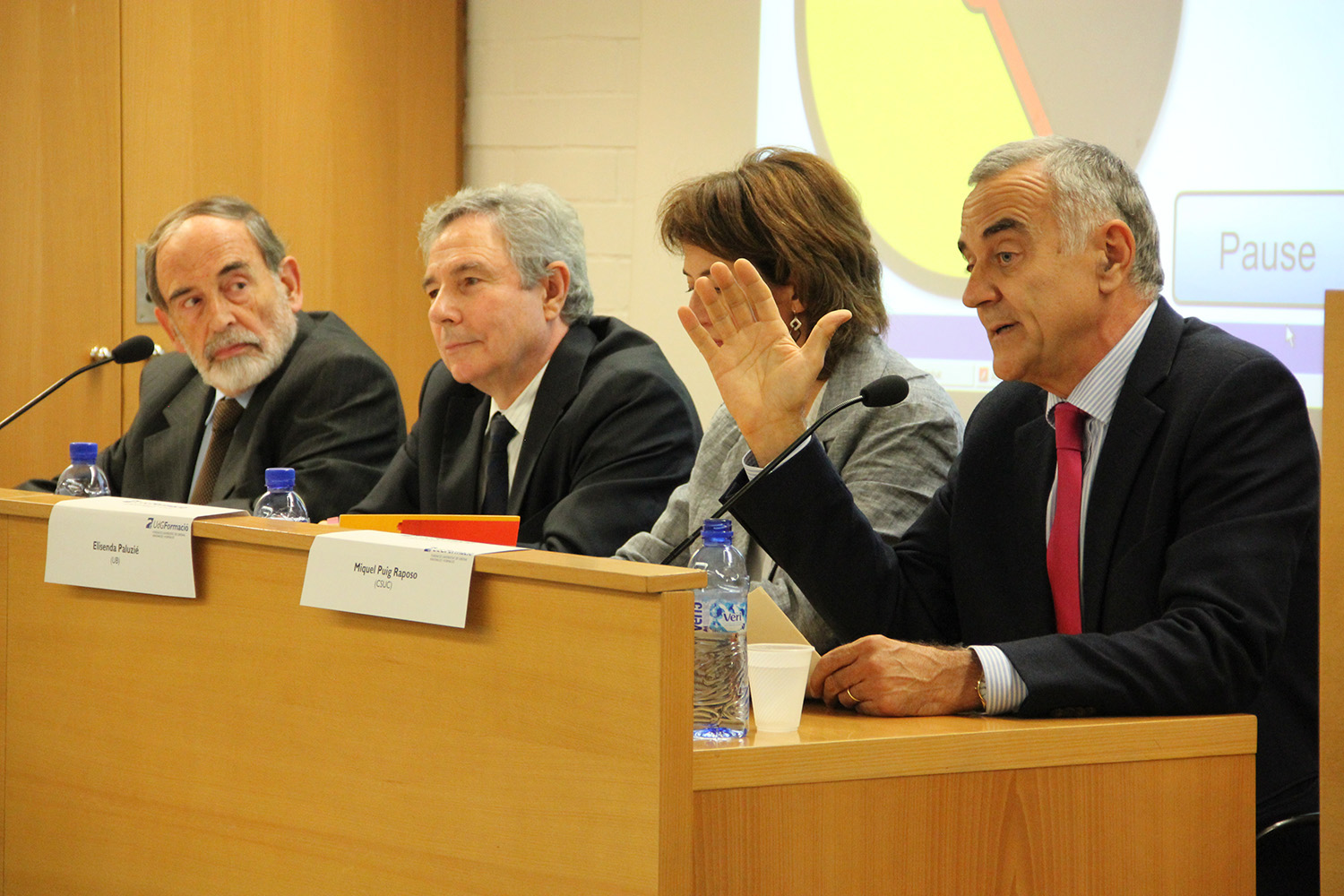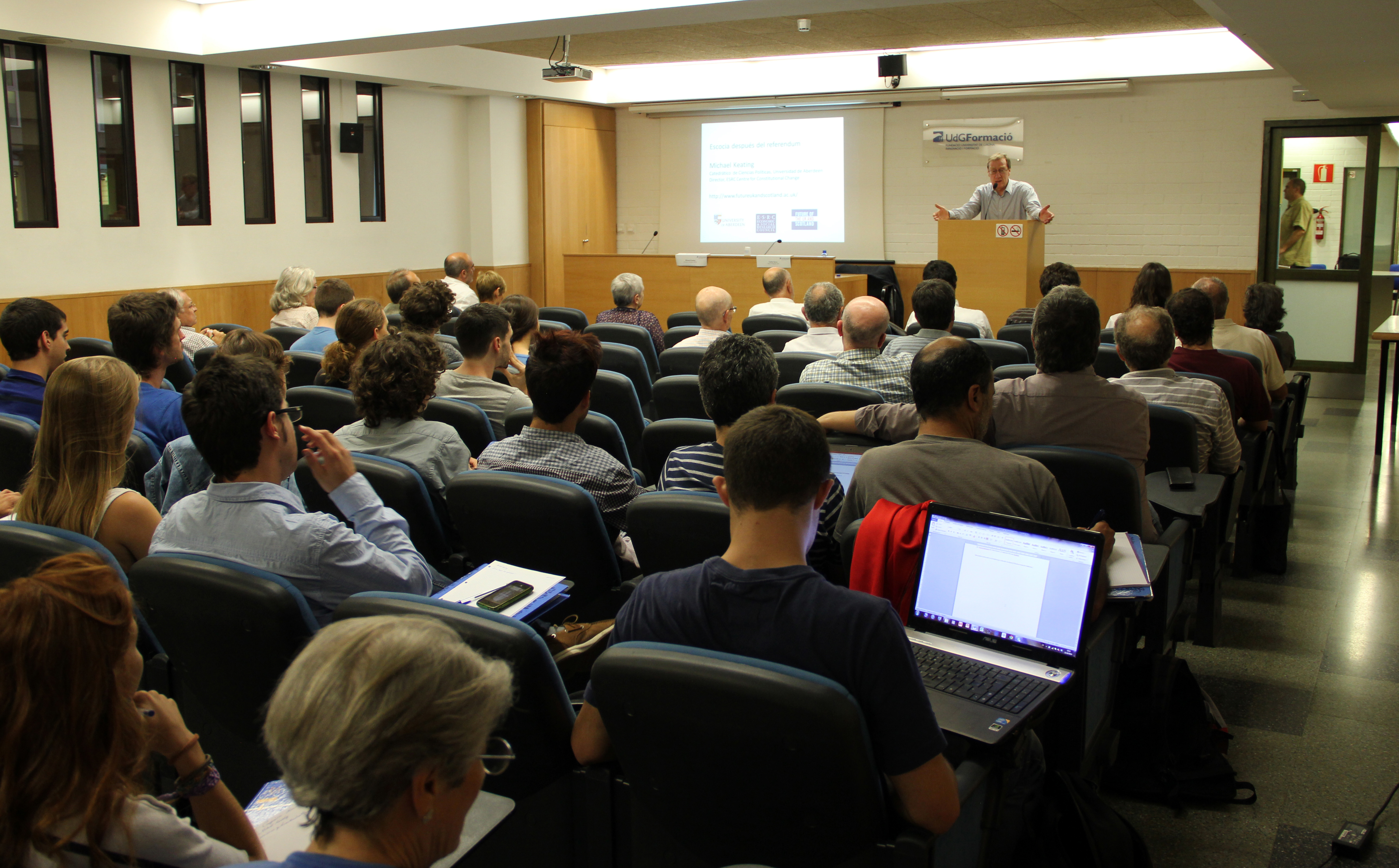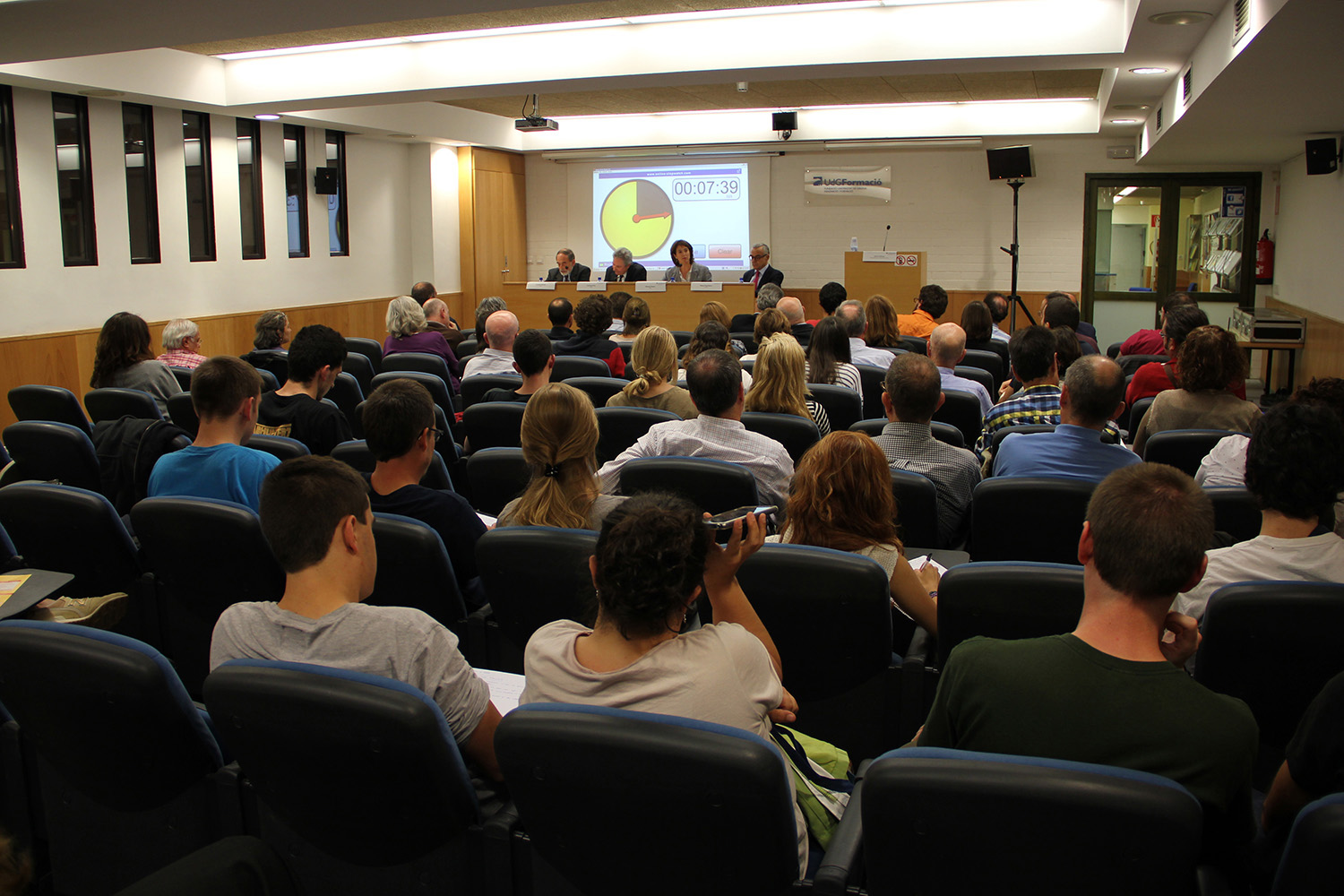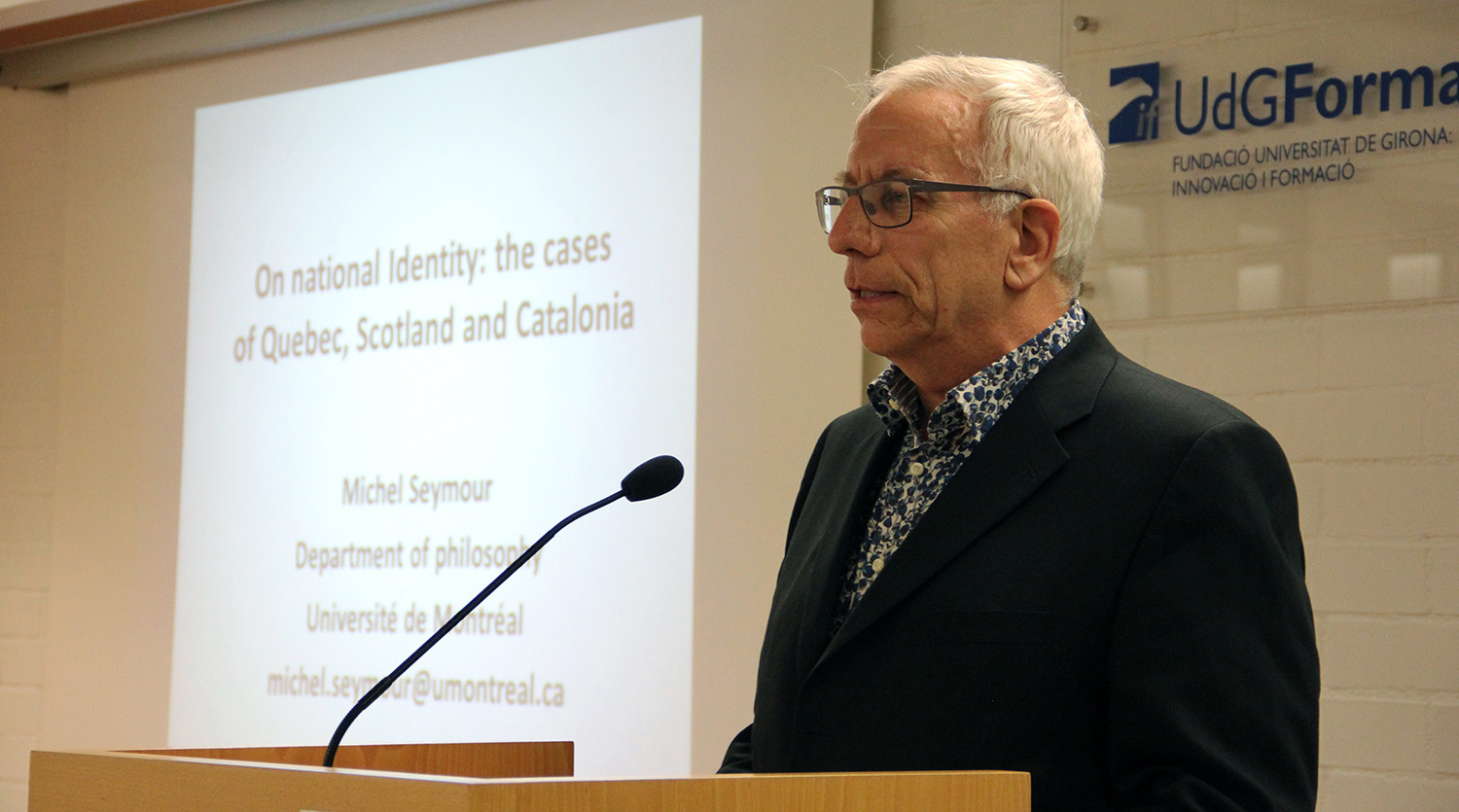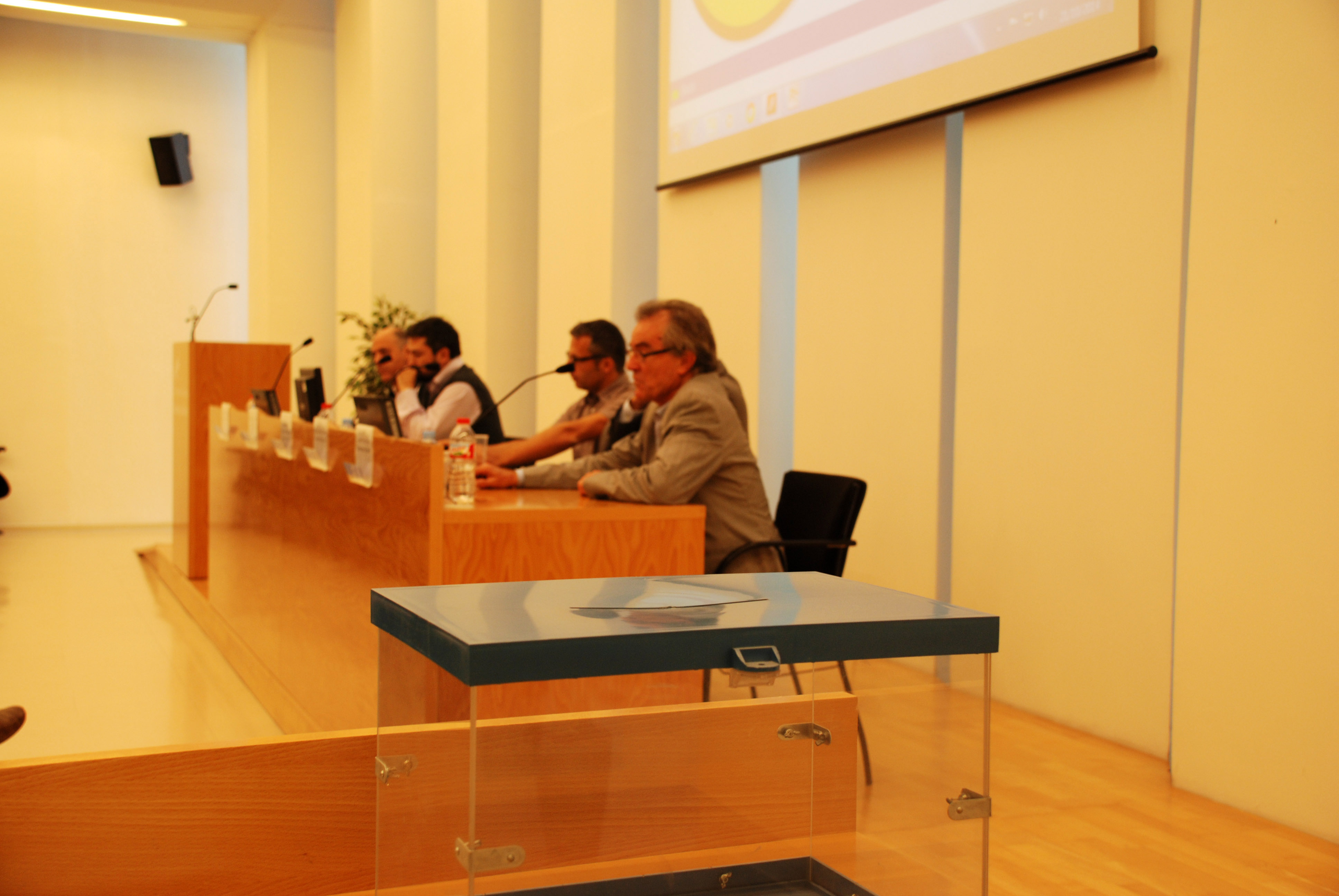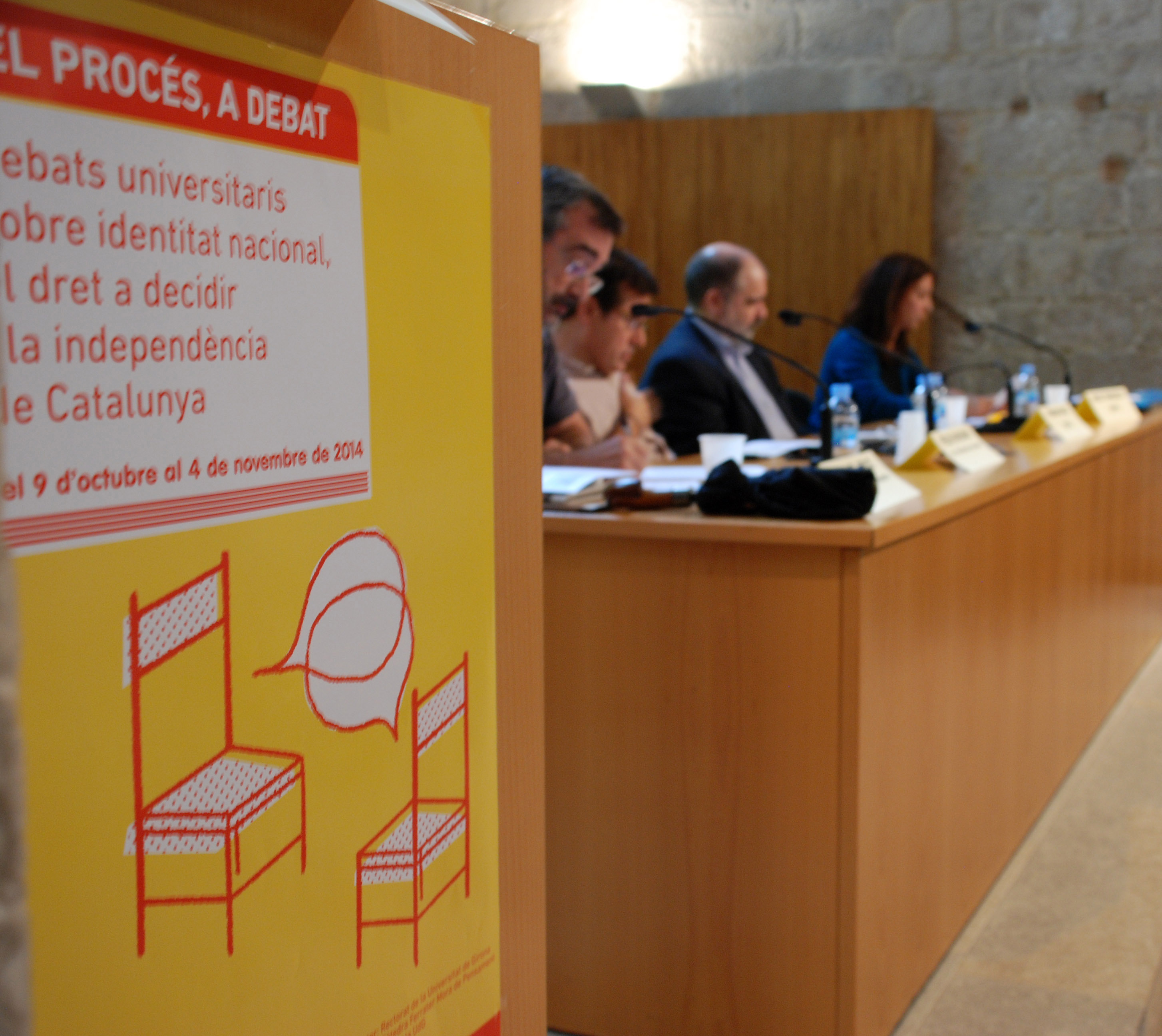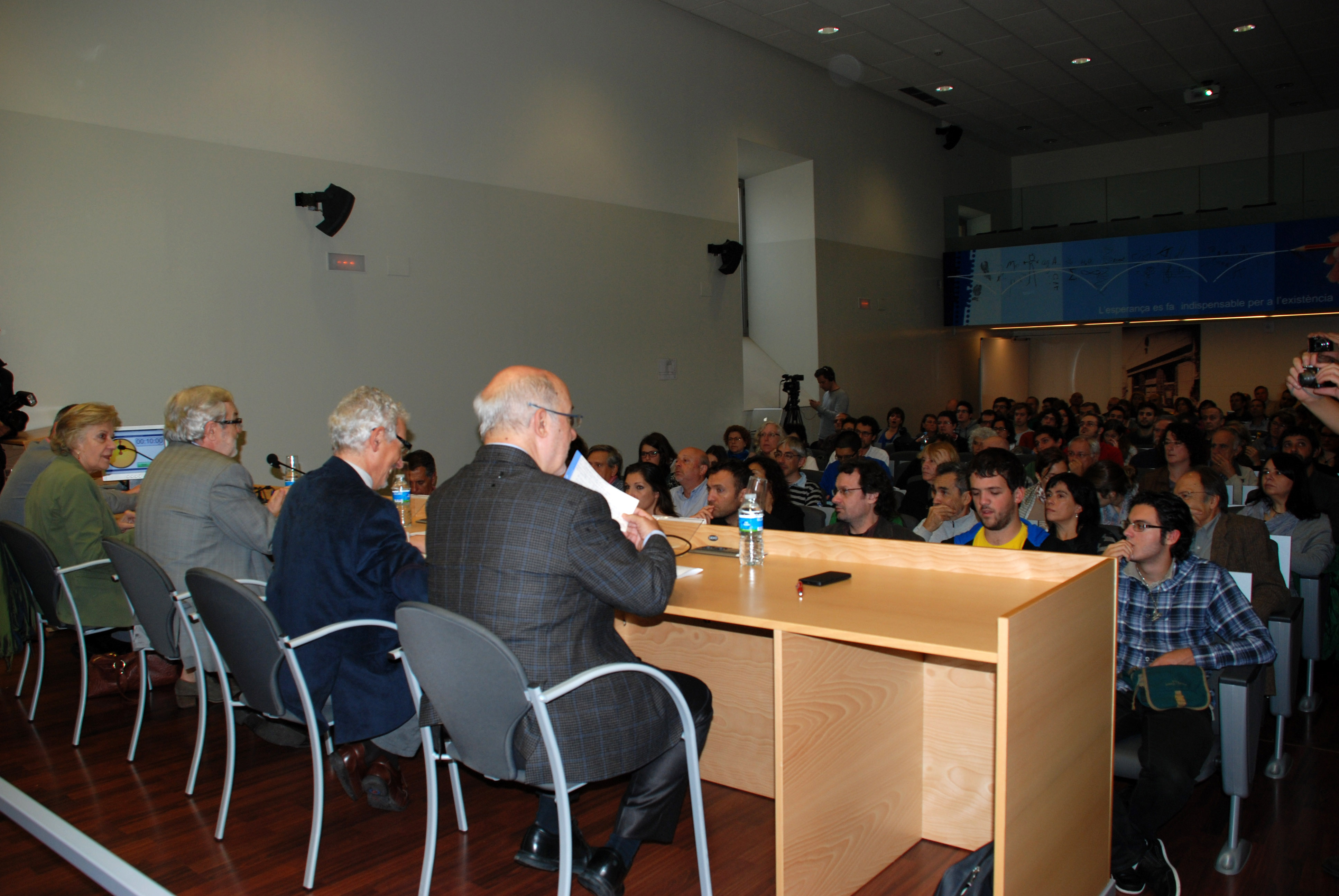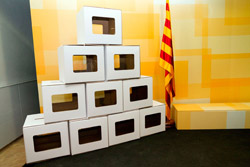
The Process, under discussion
The organization of this conference is an express response to the fulfilment by the UdG rector’s office of the government’s programme, according to which the UdG must contribute decisively to the discussion on the right to decide and the identity of peoples.
The main objective was to provide both the academic community and the general public with elements for reflection on the so-called “sovereignty process”. And to do so from an ideologically neutral point of view and guided by criteria of strictly academic value. For this reason, intellectuals and the most authoritative people on the subjects under discussion were invited. The debates and the lessons programmed did not play “in favor” of national identity, “in favor” of the right to decide or “in favor” of independence. They were discussions “about” these three issues. The only commitment that the university implicitly assumed is that Catalan society is going through a key process in its history and that, therefore, it was worth talking about it with serenity, foundation and seriousness.
On the three themes included in the title - national identity, right to decide and independence - it must be said that they constitute a thematic progression. First of all, we ask ourselves if we can talk about nations, nowadays, still. And therefore, if we can talk about the nation or the Catalan people. This will make us wonder whether the right to decide - the subject of the second debate - can be based on the existence, or not, of the Catalan nation. Do Catalans have the right to decide whether they can become a new state of Europe? If they do, on what is this right based? The first two days of debate and the first two master conferences revolved around these questions. In the last two days, the main issue was the independence of Catalonia and the reasons that Catalans should weigh when deciding whether it is convenient for them to become independent from Spain. On the third day, we asked ourselves whether or not economic interests favor the independence project. On the fourth day, we discussed what other reasons can support Catalonia’s independence and to what extent the process towards the creation of a state of their own is feasible.
Organized by: Ferrater Mora Chair of Contemporary Thought
Promoted by: Rectorate
Conferences
9/10/2014 Inaugural conference
Democràcia i canvi polític a Europa, Montserrat Guibernau (Queen Mary University of London, Anglaterra)
Presenter: Joan Vergés Gifra (Philosophy, UdG)
14/10/2014 (1st Session)
On national identity: the case of Quebec, Scotland and Catalonia, Michel Seymour (Université de Montréal, Quebec)
Presenter: Maribel Narváez (Law, UdG)
21/10/2014 (2nd Session)
Escocia después del referéndum. ¿Y Cataluña?, Michael Keating; University of Aberdeen, Escòcia
Presenter: Carles Serra (Pedagogy, UdG)
28/10/2014 (3rd Session)
The political Economy of Borders, Enrico Spolaore (Tufts University, EUA)
Presenter: Carme Saurina (Economy, UdG)
4/11/2014 (4rt Session)
El procés cap a un estat propi: llums i ombres, Carles Viver i Pi-Sunyer (President of the Advisory Council for National Transition)
Presenter: Francina Esteve (Law, UdG)
Conclusion with Sergi Bonet, Rector of the University of Girona
Debates
First Session· 14/10/2014
Debate: Does continuing to talk about national identities make sense in the 21st century?
Moderator: Antoni Defez (Philosophy, UdG)
| Yes | No |
|---|---|
| Neus Torbisco (UPF) | Félix Ovejero (UB/Impeller of Ciutadans) |
| Ferran Sáez Mateu (URL) | Manuel Cruz (UB/Federalistes d’Esquerres) |
Second Session· 21/10/2014
Debate: The Catalans should be able to vote on a possible secession from Spain, yes or not?
Moderator: Salvador Martí (Political Science and Administration, UdG)
| Yes | No |
|---|---|
| Javier Pérez Royo (Universidad de Sevilla) | Tomás de Domingo (Universitat d’Elx) |
| Ignacio Sánchez-Cuenca (Universidad Carlos III) | Miguel Ángel Quintanilla Navarro (FAES) |
Third Session· 28/10/2014
Debate: Independence would be a bad business, yes or not?
Moderator: Josep Anguera (Economy, UdG)
| Yes | No |
|---|---|
| Clemente Polo (UAB) | Miquel Puig Raposo (CSUC) |
| Francesc Granell (UB) | Elisenda Paluzié (UB) |
Fourth Session· 4/11/2014
Debate: IIndependence from Catalonia, yes or not?
Moderator: Joan Manuel del Pozo (Syndic of UdG)
| Yes | No |
|---|---|
| Josep-Maria Terricabras (UdG/ MEP for ERC) | Victòria Camps (UAB/ Federalistes d’esquerres) |
| Santiago Vidal (Judge) | Joaquim Coll Amargós (UB/ Plataform Societat Civil Catalana) |
Documents
CATN White Paper
The Advisory Council for National Transition (CATN) has produced the White Paper on National Transition. The CATN has met 55 times since its inception and has issued 18 reports over the last year and a half. These 18 reports make up the White Paper, which totals more than 1,300 pages.
“Catalonia in Spain. For the democratic coexistence”
A publication of the Ministry of Foreign Affairs and Cooperation where, as the Ministry itself describes, “one can find numerous historical, social, cultural, economic and legal references in the joint history of Catalonia and Spain, as well as abundant texts by historians, jurists, economists, political scientists and thinkers from various fields, both Spanish and from other nationalities, who have studied and written on this issue”.
Web of the 9N consultation
Website of the 9N consultation of the Government of the Generalitat de Catalunya, where you can find the full text of the Law on Consultations and the decree 129/2014 calling the non referendum popular consultation on the political future of Catalonia.
Manifesto of the National Assembly of Catalonia
Here you can consult the Manifesto in defense of the consultation of November 9 that the ANC has made public.
CEPCO (Center for Political and Constitutional Studies) website
On this website of the Ministry of the Presidency there is a “Dossier on non-referendum consultation in Catalonia” with three sections: 1. Documentary chronology: July 2006-October 2014; 2.Opinion articles; and 3. Bibliography
Opinions of the Council of State
The Council of State in session that took place on 28.09.2014, issued the following opinions:
“Challenge to the provisions without force of law and resolutions of the Autonomous Communities provided for in Article 161.2 of the Constitution against Decree 129/2014, of 27 September, calling for a non-renewable popular consultation on the political future of Catalonia.
“Appeal of unconstitutionality against certain precepts of the Law of Catalonia 10/2014, of 26 September, on non referendum popular consultations and other forms of citizen participation.
Agreements of the Extraordinary Council of Ministers of 29/9/2014
The Council of Ministers of the Government of Spain, meeting in an extraordinary session on September 29th, took these agreements to file an appeal of unconstitutionality against the call for the consultation of November 9th:
“AGREEMENT by which the President of the Government is requested to file an appeal of unconstitutionality against certain precepts of the Law of Catalonia 10/2014, of 26 September, on non-referendary popular consultations and other forms of citizen participation.
AGREEMENT to challenge the provisions without force of law and resolutions of the Autonomous Communities provided for in Article 161.2 of the Constitution in relation to Decree 129/2014, of 27 September 2014, calling for a non-referendum popular consultation on the political future of Catalonia. “
Resources of the Government of the Generalitat in the Constitutional Court
The Government of the Generalitat has presented two appeals asking for “the immediate lifting” of the suspension of the Law of Non-referendum Popular Consultations and other forms of citizen participation, as well as the decree of convocation of the consultation on the political future of Catalonia signed by the President of the Generalitat on September 27.
Press Releases
-
01/12/2014, UdGent: “El procés a debat: un repàs”, by Joan Vergés Gifra
-
26/11/2014, El País: “El debate imposible”, by Victòria Camps
-
07/11/2014, Ara: “Els ‘esportius’ debats del procés a la UdG”, by Joan Vergés Gifra
-
06/11/2014, Diari de Girona: “Carregats de raons”, by Oriol Ponsatí-Murlà
-
05/11/2014, El Punt-Avui: “Independència, sí o no?”
-
05/11/2014, El Punt-Avui: “Quan els ulls de l’Estat ens escorcollen”, by Joan Trillas
-
05/11/2014, Diari de Girona: “La independència ens fa millors?”, by Jesús Bàdenes
-
05/11/2014, Diari de Girona: “Pi-Sunyer: Hi haurà 9-N perquè és autoexecutiu”
-
29/10/2014, La Vanguardia: “La Contra: Michael Keating”
-
29/10/2014, Diari de Girona: “La sortida de la UE i el deute, les ombres econòmiques d’una Catalunya separada”
-
29/10/2014, El Punt Avui: “Escollir un hivern rus”, by Joan Trillas
-
22/10/2014, Diari de Girona: “Unes eleccions plebiscitàries, l’inici del debat sobre la independència”
-
22/10/2014, Diari de Girona: “I després d’Escòcia, el torn de Catalunya?”
-
22/10/2014, El Punt Avui: “Espanyols proconsulta”, by Jordi Nadal
-
15/10/2014, El Punt Avui: “Identitats”, by Joan Trillas
-
15/10/2014, Diari de Girona: “La Universitat de Girona debat sobre les identitats nacionals en el segle XXI”
-
14/10/2014, Diari de Girona: “La UdG debat avui sobre el sentit de les identitats nacionals al S. XXI”
-
10/10/2014, El Punt Avui: “La UdG entra de ple en el debat sobre el dret a decidir”
-
10/10/2014, Diari de Girona: “Una conseqüència de la democràcia”
-
9/10/2014, Ara: “Montserrat Guibernau inaugura el cicle de la UdG ‘Identitat nacional, dret a decidir i independència’”
-
9/10/2014, Diari de Girona: “Debat, debat, debat”, by Oriol Ponsatí-Murlà
-
30/09/2014, El Punt Avui: “La UdG prepara un gran cicle de debats”
-
29/09/2014, Ara: “Ara TV retransmetrà els debats sobre el procés organitzats per la UdG”
-
28/09/2014, El Punt Avui: “La UdG farà debats sobre el procés obert pel dret a decidir”
-
28/06/2014, Diari de Girona: “La UdG organitza entre l´11-S i el 9-N un cicle de xerrades sobre el dret a decidir”
